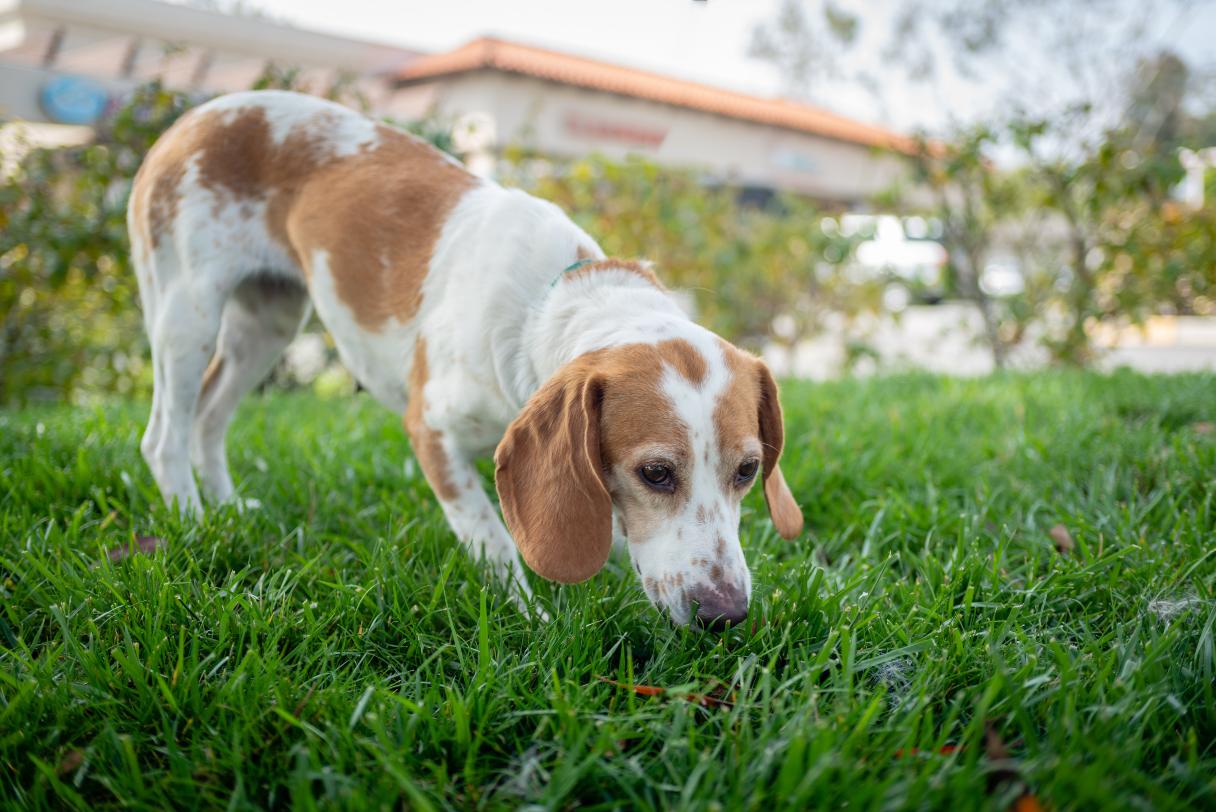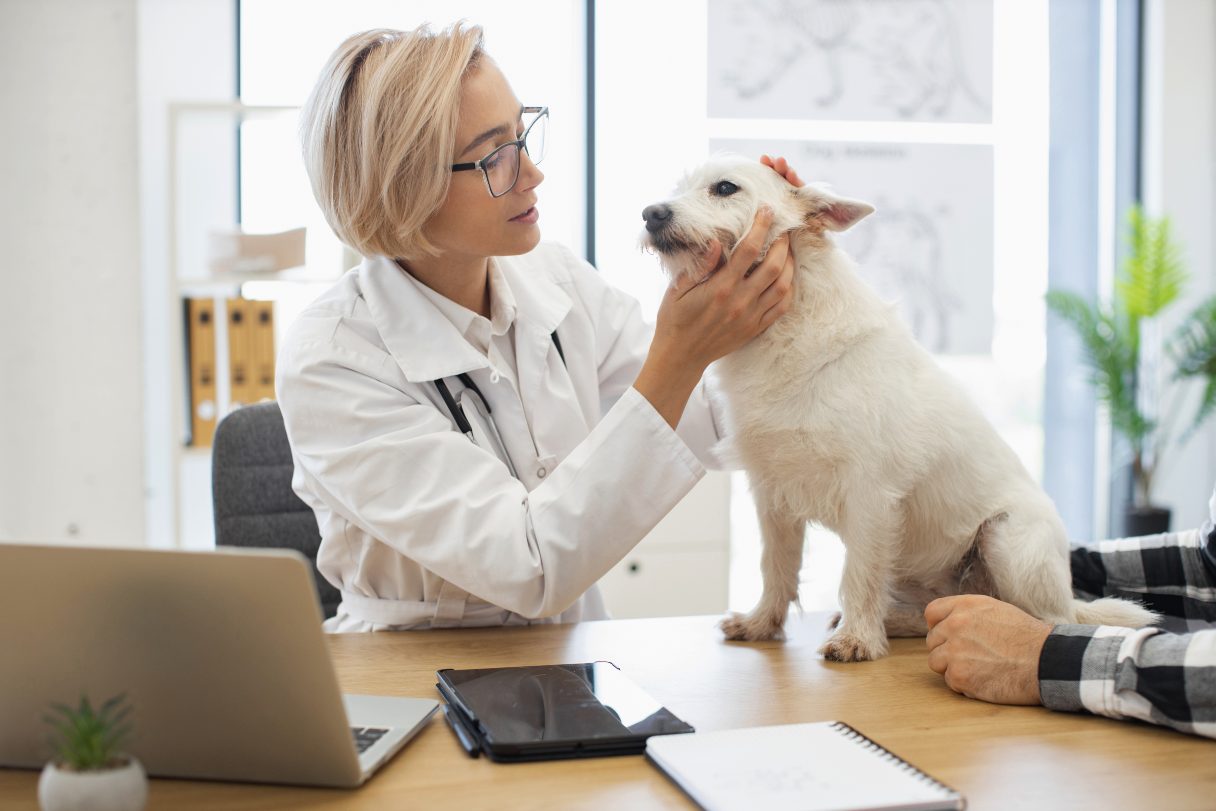Does your dog have diarrhea? If so, you may wonder what caused it and what to do about it. Diarrhea is a common ailment in dogs, with many potential causes. To get to the bottom of your dog's diarrhea, consider these 10 common causes and check out our list of ways to prevent it in the future.
What Causes Diarrhea in Puppies and Dogs?
Diarrhea is not a disease in and of itself, but rather a symptom of an underlying problem. Diarrhea has many potential causes, and sometimes we never figure out what exactly caused your dog's diarrhea. Some of the most common causes of diarrhea in dogs include:
- Dietary indiscretion. Eating foods outside of the regular diet is one of the most common causes of diarrhea in dogs.
- Diet change. A sudden change in your dog's diet can cause digestive upset, leading to diarrhea.
- Stress. Stressors like kenneling, moving to a new home or adding a new pet to the household can cause colitis, which can lead to diarrhea.
- Parasitism. Intestinal parasites like hookworms, whipworms, coccidia and giardia can all lead to diarrhea in your dog.
- Bacterial or viral infections. Infections like salmonella or parvovirus can cause profuse diarrhea and can be fatal if left untreated.
- Adverse food reactions. Food allergies or intolerances can cause diarrhea in some dogs when they eat an ingredient to which they are allergic.
- Medications. Some medications, like NSAIDs and antibiotics, can cause digestive upset, especially if given on an empty stomach.
- Toxins. Ingestion of many toxins can lead to diarrhea, including certain plants, household chemicals, heavy metals and garbage.
- GI disease. Many gastrointestinal diseases have diarrhea as a presenting symptom, including inflammatory bowel disease, exocrine pancreatic insufficiency and intestinal cancers.
- Foreign body/Obstruction. Ingestion of foreign objects or blockage of the gastrointestinal tract can lead to diarrhea.
Sometimes, we can't figure out exactly what caused a dog's diarrhea. That's OK, though, because we can still treat the symptoms of diarrhea without knowing the underlying cause.
Diarrhea Symptoms in Dogs
In addition to soft stool, you may notice other symptoms of diarrhea in your dog. Common symptoms associated with diarrhea in dogs include:
- Straining to defecate
- Increased frequency of defecation
- Increased urgency of defecation
- Frequent small volumes of stool
- Blood in the stool
- Loss of appetite
- Lethargy
- Abdominal pain
- Flatulence
- Increased borborygmi (gut sounds)
Home Remedies for Diarrhea in Dogs
If your dog has diarrhea, it's best to consult your veterinarian for advice on how to proceed. However, if your dog has only had one episode of diarrhea and is otherwise feeling well, your veterinarian may recommend trying some home remedies for your dog's diarrhea.
Home remedies should only be attempted if your dog is energetic, eating normally and has no other symptoms aside from an episode of soft stool. If your dog's diarrhea has lasted more than 24 hours or is accompanied by other symptoms such as lethargy, loss of appetite, abdominal pain or blood in the stool, contact your veterinarian right away.
If your veterinarian approves using home remedies for your dog's diarrhea, he or she may recommend the following remedies:
- Bland diet. Your veterinarian may recommend a bland diet such as boiled boneless skinless white meat chicken and rice. A bland diet helps settle your dog's stomach and can resolve some cases of diarrhea.
- Pumpkin. Some cases of diarrhea respond well to increased dietary fiber. Offering your dog plain canned pumpkin (no added spices or sugar) may help resolve some cases of diarrhea.
- Over-the-counter treatments. Your veterinarian may recommend some medications that are available over the counter to help settle your dog's stomach and relieve diarrhea. Never give your dog over-the-counter medications without first consulting your veterinarian for advice and dosing instructions.
Veterinarian Treatment for Diarrhea in Dogs
If your dog's diarrhea lasts more than 24 hours, or if it is accompanied by other symptoms such as blood in the stool, vomiting, lethargy, abdominal pain or loss of appetite, your dog should see a veterinarian for evaluation. Your veterinarian will perform a complete head-to-tail physical examination and may recommend some diagnostic tests such as the evaluation of a fecal sample or blood work.
Your veterinarian may prescribe some or all of the following treatments for your dog's diarrhea:
- Antibiotics. Your veterinarian may prescribe an antibiotic to help resolve your dog's diarrhea. You should follow your veterinarian's dosing instructions carefully and continue to give the full course of antibiotics, even if your dog's diarrhea resolves before the course is finished.
- Probiotics. Probiotics help populate your dog's gut with beneficial bacteria. They may be prescribed alone or in conjunction with antibiotics. Probiotics are typically available as a powder or capsule that you can either give your dog directly or sprinkle on your dog's food.
- Diet. Your veterinarian may recommend a bland diet for your dog, or he or she may recommend a prescription diet that is easily digestible to help resolve your dog's diarrhea.
- Fluids. Diarrhea is dehydrating, especially if it has been profuse. Your veterinarian may prescribe subcutaneous (SQ) or intravenous (IV) fluids to help rehydrate your pet.
- Antiemetics. If your pet has experienced vomiting or loss of appetite along with diarrhea, your veterinarian may prescribe an antiemetic medication to manage nausea. This medication may be administered orally or by injection.
- Antiparasitics. If your dog's diarrhea was caused by a parasite infection, your veterinarian may prescribe antiparasitic medications to address the infection. Be sure to follow your veterinarian's dosing instructions carefully, as multiple courses of medication may be needed to address the full life cycle of the parasite.
How Long Does Dog Diarrhea Last?
Many cases of dog diarrhea self-resolve within a few days. Some cases of diarrhea may last longer, depending on the underlying cause of the diarrhea. Diarrhea can last weeks or even months in some cases, especially if it is left untreated.
To resolve your dog's diarrhea as quickly as possible, see your veterinarian to have the diarrhea appropriately diagnosed and treated.
Preventing Dog Diarrhea in the Future
There are several steps you can take to help prevent diarrhea in the future. Consider implementing the following preventive measures to ensure your dog does not get diarrhea again.
- Limit stress. Stressors like kenneling or changes in the environment can cause colitis, which often leads to diarrhea. Reducing stress and anxiety as much as possible will reduce your dog's risk of developing diarrhea.
- Use probiotics. Probiotics help populate your dog's gut with beneficial bacteria, which can prevent or reduce the severity of diarrhea. Your veterinarian can recommend an appropriate probiotic product for your dog.
- Feed an appropriate diet. Feeding a consistent diet that is appropriate for your dog's age, weight and health status can help prevent diarrhea. Be sure to also limit your dog's intake of treats and table scraps, which can cause indigestion.
- Transition diets gradually. If you need to change your dog to a new diet, do so gradually over the course of a week or two. A gradual transition will prevent your dog from developing gastrointestinal upset that can lead to diarrhea.
- Keep toxins out of reach. House plants, household chemicals, garbage and other toxins can cause diarrhea if ingested. Keep these hazards safely out of your dog's reach to prevent diarrhea.
- Stay up to date on vaccinations and preventive medications. Keep your dog healthy by getting regular checkups with your veterinarian and staying up to date on your dog's preventive healthcare.
CareCredit Financing for Veterinary Treatment
The CareCredit credit card provides a convenient way to pay for your dog's vaccinations and other health and wellness expenses, including exams, medications and products at providers in the CareCredit network.* Apply today and continue your wellness journey by downloading the CareCredit Mobile App. You can find a provider on the go, manage your CareCredit account and easily access the Well U hub for more great articles, podcasts and videos. Use our Acceptance Locator to find a veterinarian that accepts CareCredit to help keep your pet healthy and happy for a lifetime of love.
Author Bio
Dr. Elizabeth Racine is a small animal general practice veterinarian and freelance writer. She covers both human and veterinary medicine with a special interest in nutrition, internal medicine and veterinary behavior.








